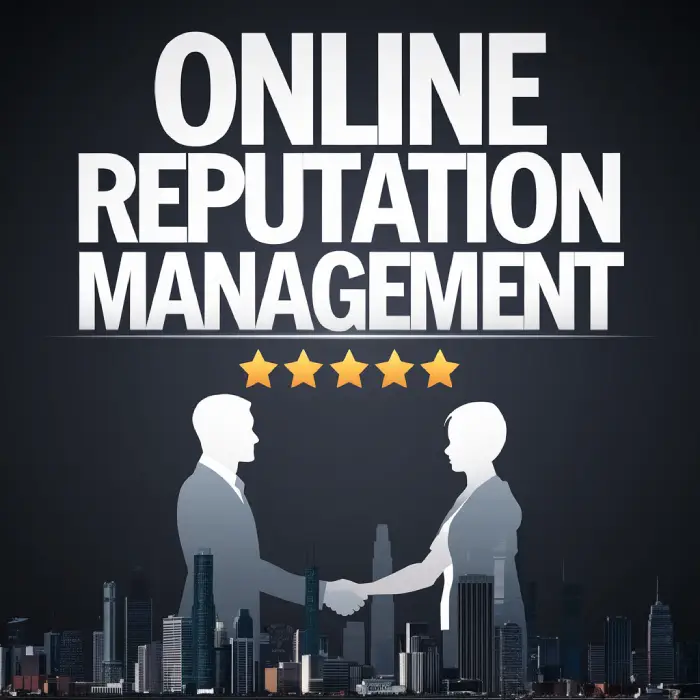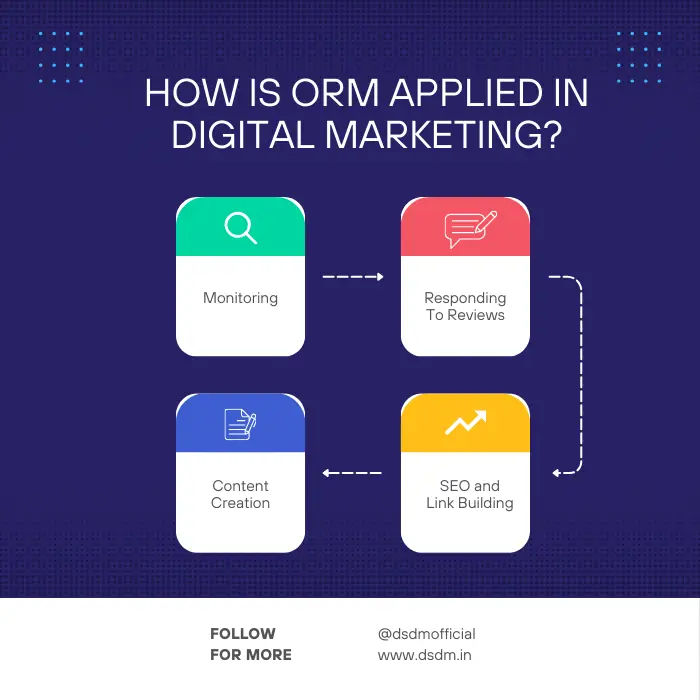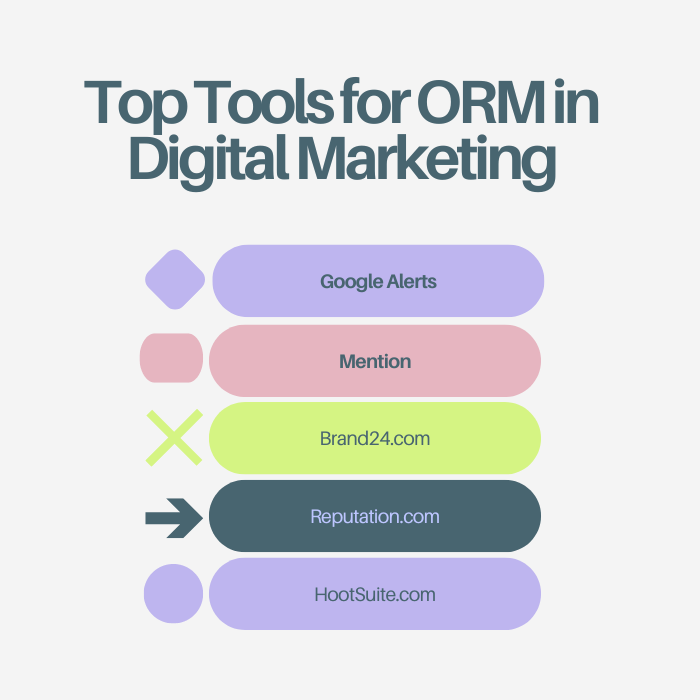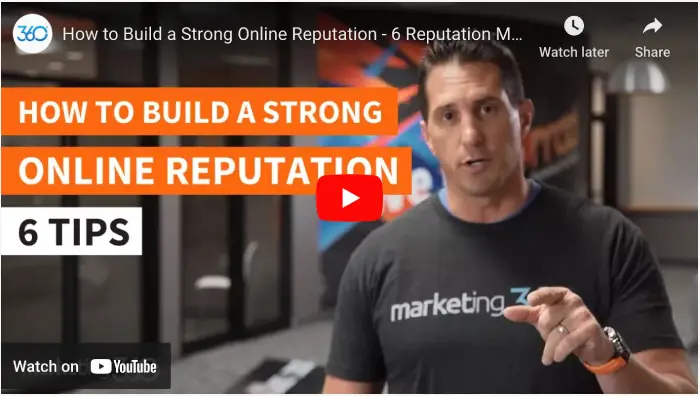In today’s fast-paced digital world, your brand’s online reputation can make or break your business. Whether you’re a small business owner or managing a large enterprise, Online Reputation Management (ORM) is crucial to stay ahead of your competitors and win the trust of your audience.
But what exactly is ORM, and how can it benefit your digital marketing efforts?
Let’s dive in and explore everything about ORM, why it matters, and how you can use it to grow your brand online.
What is Online Reputation Management (ORM)?

Online Reputation Management refers to the practice of monitoring, managing, and improving how your brand is perceived online.
ORM focuses on public opinion, reviews, and brand mentions across various digital platforms like search engines, social media, and review sites.
It’s not just about dealing with crises or negative reviews it’s about consistently building and maintaining a positive image over time.
When people Google your brand, the results they see can directly impact their trust and buying decisions. That’s where ORM steps in.
Why is ORM Essential in Today’s Digital Landscape?
ORM is more important now than ever before. With the rapid rise of digital platforms like Yelp, Google Reviews, and social media, consumers have the power to voice their opinions about businesses in real-time.
Whether it’s a glowing review or a damaging complaint, the reputation you build or fail to build can heavily impact your sales, trustworthiness, and overall growth.
Here’s why ORM is vital in digital marketing:
How to Analyze Your Online Reputation?
Understanding how your brand is perceived online is the first step in any ORM strategy. Here’s how you can analyze and assess your online reputation:
Key Metrics to Monitor:
- Customer Reviews: Regularly check platforms like Google, Yelp, TrustPilot, and social media for reviews.
- Social Mentions: Track where and how often your brand is mentioned on platforms like Twitter, Instagram, and Facebook.
- Search Engine Results: Google your brand and see what appears on the first page this is what your potential customers see.
Tools for Reputation Monitoring:
- Google Alerts: Set alerts for your brand name to get real-time notifications when you’re mentioned online.
- Brand24: A powerful tool for tracking brand mentions and analyzing sentiment.
- Mention: Allows you to monitor social media, blogs, and websites for discussions about your brand.
Steps to Conduct an Online Reputation Audit:
- Search Your Brand Name: Look at the search engine results and analyze the first few pages.
- Check Social Media: Monitor comments, tags, and mentions.
- Evaluate Online Reviews: Aggregate reviews from Google, Yelp, and other review sites. Analyze both positive and negative feedback.
How Does ORM Work in Digital Marketing?

The process of ORM in digital marketing revolves around monitoring, addressing, and enhancing how your brand is perceived online.
Here’s how ORM typically works:
Monitoring: Constantly track brand mentions, reviews, and discussions across various platforms.
Responding to Reviews: Whether positive or negative, responding promptly to reviews shows that your business values customer feedback. Negative reviews should be handled with professionalism and solutions rather than excuses.
Content Creation: Positive, high-quality content can push negative stories down in search engine results. Regularly updating your blog, social media, and press releases helps with this.
SEO and Link Building: By building a positive backlink profile and optimizing your content, you can ensure that search engines favor positive mentions about your brand over negative ones.
The Role of Social Media in ORM
In today’s digital world, social media is a powerful tool for managing your online reputation. But it can also be a double edged sword, one bad tweet can go viral, and suddenly, your brand’s reputation is at stake.
Best Practices for Social Media ORM:
- Respond Quickly: Social media operates in real-time, so your responses need to be quick.
- Be Transparent: If there’s a mistake, own it. Transparency builds trust.
- Engage Positively: Regularly engage with your audience, not just when there’s a crisis. Positive interaction builds loyalty.
Why ORM is Different from Public Relations (PR)?
While both ORM and PR are about managing a brand’s reputation, they differ in their approaches:
Key Differences:
ORM is Ongoing: ORM is a continuous process where you monitor and manage your online reputation daily, whereas PR is often campaign focused.
ORM is More Reactive: ORM often deals with real-time feedback and immediate issues (like bad reviews), while PR is more strategic and long-term.
ORM Focuses on Digital Spaces: While PR works across all media online, print, TV—ORM focuses primarily on digital spaces like search engines, social media, and review platforms.
SEO and ORM: How Search Engines Influence Online Reputation?
Your brand’s search engine presence is the digital equivalent of a first impression.
Here’s how SEO and ORM go hand-in-hand:
- Brand Mentions and Rankings: Positive brand mentions can boost your SEO. Conversely, bad reviews or news stories can pull your rankings down.
- Reputation on Google: The first few results on Google are crucial for how your brand is perceived. A solid ORM strategy helps you dominate these results with positive content.
Top Tools for ORM in Digital Marketing

- Google Alerts: It is a free tool that notifies you via email whenever your brand or selected keywords are mentioned online. It helps businesses track brand mentions across blogs, news websites, and forums in real-time.
- Mention.com: A powerful tool that allows you to monitor your brand mentions across social media, blogs, news sites, and the web. Mention.com offers real-time notifications and sentiment analysis to help you stay on top of your brand’s online presence.
- Brand24: A robust tool that tracks your brand mentions across social media, websites, blogs, and more. It provides sentiment analysis and detailed insights to help you manage your reputation, engage with your audience, and respond to potential crises quickly.
- Reputation.com: An all-in-one platform for ORM that helps businesses manage their online reviews, social media interactions, and customer feedback. It allows for centralized reputation management, ensuring you maintain a positive brand image.
- Hootsuite: A popular social media management tool that allows you to schedule posts, monitor mentions, and respond to customer interactions across multiple social platforms. It helps streamline social media reputation management by keeping track of engagement in one place.
If you’re looking to learn ORM as part of your digital marketing strategy, enrolling in a comprehensive digital marketing course like the one offered by the Delhi School of Digital Marketing can provide you with the right skills to master online reputation management and much more.
Types of ORM Strategies
- Focus on building a positive image from the start.
- Engage in reputation building activities like gathering positive reviews and publishing valuable content.
- Deals with negative feedback and crises as they happen.
- Strategies include addressing customer complaints promptly and mitigating the damage from bad press.
Crisis Management in ORM
No matter how well you manage your brand, a crisis can happen.
Here’s how to handle it effectively:
- Acknowledge the Issue: Never ignore negative feedback.
- Address the Problem: Be transparent about what happened and how you’re fixing it.
- Keep the Communication Flowing: Regularly update your audience on the situation.
Measuring the Success of ORM
How do you know if your ORM efforts are paying off?
Here are the key metrics to track:
- Sentiment Score: Analyze whether the overall sentiment around your brand is positive or negative.
- Review Volume and Quality: Are you getting more positive reviews?
- Social Mentions: Track how frequently your brand is mentioned and whether those mentions are positive.
The Cost of Ignoring ORM
Ignoring ORM can have dire consequences, including loss of revenue, trust, and credibility.
For example, brands like United Airlines, Samsung and Pepsi have faced massive backlash due to poorly managed online crises.
In fact, brands can bounce back from disasters, but it requires proactive ORM strategies and swift, thoughtful responses to regain customer trust.
Visit this link to learn more about how these brands managed their crises and recovered.
Future Trends in ORM: What to Expect?
With AI and machine learning entering the scene, ORM is becoming more automated. Tools can now predict crises before they occur and help brands manage their reputations more efficiently.
Emerging Trends:
AI-Powered Sentiment Analysis: Automation will enable faster responses to negative comments.
Blockchain and ORM: The rise of decentralized networks could add transparency to how brands manage their online reputations.
FAQ: All You Need to Know About ORM
Common ORM mistakes include:
- Ignoring negative feedback or reviews.
- Responding defensively or emotionally to criticism.
- Failing to monitor your brand regularly.
- Not being transparent or honest in your communication.
- Delaying responses to online queries or complaints.
Ignoring ORM can lead to significant risks, including:
- Damage to your brand’s reputation from unaddressed negative reviews or social media posts.
- Loss of customer trust and potential revenue.
- Lower search engine rankings as negative feedback dominates your brand’s online presence.
- Missed opportunities to improve your products or services based on customer feedback.
Effective ORM fosters brand loyalty by demonstrating that your business values customer feedback and is committed to resolving issues.
By consistently engaging with your audience and addressing concerns, customers are more likely to feel appreciated and loyal to your brand.
Yes, ORM strategies can vary based on the size and scope of the business.
Small businesses may focus more on personal engagement with customers and local reviews, while large corporations often need a comprehensive ORM plan involving multiple channels, automation tools, and dedicated teams for social media monitoring, review management, and crisis communication.
ORM heavily influences purchase decisions as consumers often research online reviews, testimonials, and the overall online presence of a brand before making a purchase.
Positive reviews, high ratings, and timely responses to customer concerns build trust and can increase the likelihood of customers choosing your product or service.
Content creation is vital to ORM as it helps shape your brand’s narrative online.
Publishing blog posts, articles, social media updates, and other valuable content that reflects your brand’s values can push negative content down in search results and improve your brand’s online visibility.
Yes, ORM can be outsourced to digital marketing agencies that specialize in reputation management.
These agencies typically offer services like monitoring online mentions, managing reviews, handling social media interactions, and responding to negative feedback on behalf of your business.
All industries can benefit from ORM, but it is especially important for:
- Hospitality and Travel: Online reviews and customer feedback heavily influence bookings.
- Retail and E-commerce: Customer reviews directly impact sales and brand trust.
- Healthcare: Reputation is critical for gaining patient trust.
- Real Estate: Buyer and seller decisions are influenced by agent reviews and online presence.
- Financial Services: Customers rely on the credibility and trustworthiness of financial institutions.
Conclusion:
Managing your brand’s online reputation isn’t optional it’s a critical component of your digital marketing strategy

